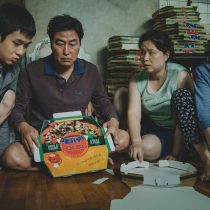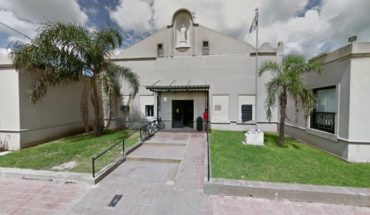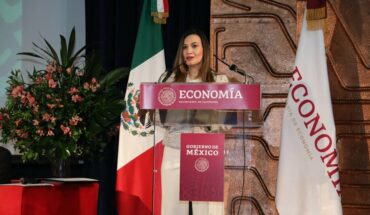
The Oscar for Best Picture this year, for the first time, fell in a non-English speaking production: Parasite (“Parasites”), a black-humored portrayal of the relations between the poor and rich in South Korea.
The film is a critique of acute class differences in a capitalist and unequal society that, surprisingly, is neither the Brazil where favelas and mansions coexist; nor the United States where 1% of the population accumulates one-fifth of the country’s wealth.
Lol The story of how the Kims, a family living in a humble semi-basement, contrived to the privileged Parkes residing in a designer house, is set in Seoul, the capital of South Korea.
That is, a nation that is among the 15 largest economies in the world, where life expectancy is among the highest on the planet and nearly half of the population has higher education.
However, in Parasite, the Kims have trouble finding employment and seek life with jobs such as folding boxes of pizzas into their insect-infested semi-basement.
But when their son gets the Park’s daughter English tutor position, the Kims launch a plot to get everyone to end up working for that wealthy family that, unlike them, can afford to live on land , enjoy sunlight at home and outsource household chores.
So how true to reality is “Parasite”?
South Korea, “hell”?
With an unemployment rate of just 3.6%, having jobs in South Korea shouldn’t be difficult or time-consuming.
Of the countries of the Organization for Economic Cooperation and Development (OECD), the club of the richest nations in the world, it has the lowest long-term unemployment rate: 1.4%.
Its efficient healthcare system, accompanied by a healthy lifestyle, helps it to enter the list of 10 countries with the highest life expectancy.
After devastating conflicts such as World War II (1939-1945) or the Korean War (1950-1953), within a few decades South Korea reinvented itself as an industrialized economy and a leader in technological innovation, improving living conditions of its citizens.
However, the South Koreans do not seem very happy with their current situation: three out of four young people between the ages of 19 and 34 want to leave the country, according to a survey published in December by the newspaper The Hankyoreh.
What’s more, eight out of 10 see South Korea as a “hell.”
Shin Hyun Bang, professor of Urban Studies at London School of Economics (LSE) specializing in Asia, explains that the nation has undergone major changes over the past 20 years that have not yet been assimilated.
After nearly two decades growing each year to an average of 9%, South Korea was one of the countries hardest hit by the Asian financial crisis that erupted in 1997. The following year, its GDP fell by more than 5%, according to World Bank data.
“Because the country’s development was so rapid during the 20th century, there is a vivid memory among the more adult generation of the opportunities they had access to in the 1970s or early 1990s, when the economy was expanding and jobs offered security” Shin explained to BBC Mundo.
“But since then this has changed, making the level of inequality that people fear greater than the target.”
The Gini coefficient is often the most commonly used measure for assessing inequity in a society and consists of a range of 0 to 1, where figures closer to 0 indicate greater equality than those close to 1.
South Korea’s is 0.35, according to the OECD. That is, below 0.46 in Chile and Mexico or even 0.39 from the United States; although still far from 0.29 from France or 0.26 from Denmark.
Despite being more egalitarian than countries like the UK or the US, South Koreans’ perception is another and partly the blame lies in the fact that, although their economy is now expanding, it does so at a much lower rate than before the crisis.
“Now it presents a pace of growth like that of developed countries and that means it’s not lifting people out of poverty the way they used to, so there’s a sense that people are stagnant,” Owen Miller World told BBC , professor of Korean Studies at the School of Oriental and African Studies (SOAS) at the University of London.
Too many college graduates?
In the aftersee of the crisis, the Asian country experienced labor easing that Miller and Shin said led to large differences in opportunity between generations and a lack of job stability.
If South Korea has low unemployment but recorded one of the highest incidences of labor tension in the OECD: 51% of workers say they are demanding more than they can give.
“They went from a situation where most had a stable job in one company to another where most work with eventual contracts. So there’s more insecurity, more inequality, and lower growth rate,” Miller said.
“Another thing South Koreans talk about a lot is intense competition: everyone wants to go to the best universities, everyone wants their kids to do well. But all of this is psychologically damaging,” he explained.
“Because for decades going to college was seen as the most desirable and the best way to get a white-collar and safe job, it has ended up becoming one of the countries with the highest college graduate rates in the world.”
More than 30% of South Koreans have a job for which they are overqualified, according to a Bank of Korea report released in 2019.
According to the central bank, the country suffers from an “over-education” problem that generates underemployment that is difficult to get out of: three out of ten South Koreans have a job for which it is overqualified has been in that situation for at least three years.
The frustration of this lack of balance is especially felt among young people, as Shin noted: “There are more jobs whose demand is growing: those of lower qualifications, in factories, etc. And that’s why we see immigration of foreign workers in South Korea.”
“But I don’t think these jobs meet the expectations of the younger generation, who have college degrees. Whoever went to college has an expectation of getting certain positions.”
The government has reacted by implementing programs to export professionals such as K-move, an initiative to help young South Koreans find “quality jobs” abroad. Although the number of employees you ship out is still low – less than 6,000 in 2018.
As he told the agency last year Reuters the vice-dean of the Asian Development Bank Institute, Kim Chul-ju: “Brain drain is not an immediate concern for the government. On the other hand, it is more urgent to prevent them from falling into poverty.”
Golden and mud spoons
In the face of overeducation and few job opportunities for professionals, another problem that South Koreans define this way is being exacerbated: that of which spoon one is born with.
“In short, having ‘golden spoon’ refers to what one can enjoy from their parents, in terms of the wealth and social capital they can inherit,” Shin explained.
“And having ‘mud spoon’ refers to the absence of that heritage that the younger generation will never enjoy. If you have a mud spoon, you won’t have the kind of social network you’d have if your parents had good connections.”
The lack of a level playing field for young generations is a very present issue in South Korea, where people say that the spoon with the grow (silver for the middle class) will influence the progress they can make in their careers or their ability to access to a dwelling.
In the survey published by The Hankyoreh, 85% of young people agreed with the following statement: “People who were born poor will never be able to compete with people who were born rich.”
“In South Korea, there’s a sense that you’re either a winner or a loser,” Miller said.
“If you study hard and get into a good university, then you’ll get a decent job and you’ll be a winner. If you don’t, that’s how far you’ve come, you’ll be completely marginalized and you’ll be a loser like the Kim family.
“They’re not dumb, they’re smart, but they’ll never succeed in society. And, today, that’s very much based on family wealth and that’s why I think South Korea is the country with the highest family spending on education in the world.
“While most go to public schools, they all receive education outside the school system, almost without exception. It’s about how much extra education you can give your kids. If you’re from a poor family, you can give them something, but it won’t be enough to keep them on the same level as the son of a middle-class or wealthy family.”
Striving in studies is no longer seen as the key to climbing the social ladder: “People feel that this is no longer possible, that the middle class and the rich have monopolized good universities, good colleges and access to good jobs.”
Until recently, Miller continued, South Korea was a “relatively flat” society: “Until the 90s, the perception was that everyone was fighting together. There were a few rich but it wasn’t super-flashy.”
Something that is seen today and that has been portrayed in Parasite, but also in phenomena such as Gangnam Style, Psy’s song about a seen-to-end Seoul neighborhood.
The OECD points to South Korea as one of its members with the highest income inequality, where therich people earn four or five times more than the poorest. But according to United Nations data, the most privileged 1% accumulate st. 12.2% of wealth. A figure close to that of the United Kingdom and Denmark, which in Chile is in Chile soars to 23.7% and in the US, to 20.2%.
Global problems
One of the aspects that most symbolizes the differences between the Kims and the Parkin Parasiteare the houses.
The type of semi-basement in which the Kims live is known in South Korea as banjiha, was intended as an emergency bunker and it wasn’t until the 1980s housing crisis that the government legalized their rent as a home.
Anyone can peek into their little windows to see what’s going on inside, and from the dining room table, the Kims can see drunks urinating outside.
The Park, on the other hand, live in a building where the architect who designed it once resided. Its living room is dominated by a large window that overlooks a large garden.
Sunlight becomes important in the film, as the director, Bong Joon-ho, explained in an interview with Indiewire published in October: “The poorer you are, the less access you have to sunlight and so it is in real life: they have limited access to windows.”
And to rooms: South Korea is among the OECD countries with the lowest average rooms per person (1.4). But in terms of access to housing, the entity placed it in 2017 as one of the best.
Although according to a country report published the following year by the UN Special Rapporteur on adequate housing, Leilani Farha: “Lack of affordable housing is a substantial barrier to living in a suitable property.”
Rents not only account for 50% of South Koreans’ wages, but many of the homes are “so small that even with only one or two residents already overcrowded,” he said.
In addition, the most common type of rent in South Korea is “chonsei”, whereby tenants suddenly deposit an amount equivalent to between 50% and 70% of the house or apartment. The landlord invests this money and, at the end of the rental agreement, returns it to the tenants but takes the interest. This means that to rent a home you have to have saved hundreds of thousands of dollars.
Why then does the OECD place South Korea in a good place in this regard?
In all other nations, housing has also become a problem.
Selling and rental prices continue to rise in many countries in Europe, where many adults are forced to share a department because they cannot pay an entire one for themselves. In cities like London, it has become common for there to be no living rooms in the houses because they are rented as rooms.
College graduates who end up underemployed are also a profile that is increasingly seen at different latitudes on the planet. In Spain, for example, they account for 37.6%, according to Eurostat data.
Latin America has also seen its growth moderate in recent years, and the fear that this will push some into poverty was an important part of the protests that erupted in late 2019 in nations like Chile.
Shin, of the LSE, believes that the secret to the success of Parasite it is not in that there is a special interest in South Korea, but in that it portrays problems that have become universal: “Parasite and its popularity is not because it teaches the current reality of South Korea, but because many of the aspects it shows speak of situations that occur in many other countries.”





